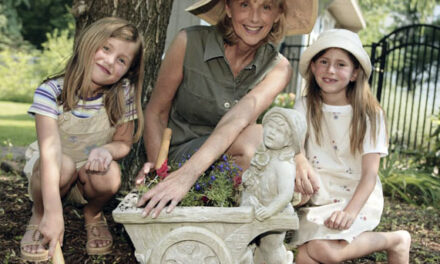by Dr. Ken Canfield
There’s a word I often think of that captures one of the most important virtues I want for my grandchildren: discernment. I hope they learn at an early age how to identify what is true and false, right and wrong—and how to live it out in everyday life.
Today’s children, at younger and younger ages, face a variety of pressures to look, act, and be a certain way. They will need discernment as they make all kinds of decisions now and throughout life regarding friends, lifestyle, the media and entertainment they watch or listen to, the games they play, the money they spend, and, ultimately, the life they lead.
Do you ever worry about your grandchildren?

They’re growing up in a world that, from my perspective, seems to get stranger and unhealthier every day. So much of what they see and hear around them will encourage them to find their own truth based on feelings or celebrity opinions or whatever the latest belief system might be, which is likely to change next week.
I want better for my grandchildren, and I suspect many of you agree. That’s one reason I try to help teach them how to discern what’s right when they encounter gray areas and outright lies. What are moral absolutes? What is good and what’s evil? Can they distinguish humility from arrogance?
Since no parent or grandparent can fully prepare children for every possible issue or challenge they will face, helping them develop discernment becomes an even greater gift and investment in them. We worry much less when we know they’re well prepared as they go out into a world that is often immoral, dishonest, and cruel.
There’s a Bible verse in Jeremiah that says,
Stand at the crossroads and look; ask for the ancient paths, ask where the good way is, and walk in it.
I hate to break it to you, but to our grandchildren we are “the ancient paths,” and they need the benefit of our experience and wisdom as they consider options and think through possible consequences of their choices.
How can we teach discernment to our grandkids?
It’s a bit of a mystery, like planting seeds that we hope will eventually grow. We can describe discernment, cultivate it, and role play situations requiring it, but there’s no guarantee that our grandkids will grow in it. After all, there are conditions that we can’t control and some we don’t even know about. Some kids, despite the best efforts of their parents, grandparents and others, still choose rebellion and a destructive life.
So although there are no guarantees, it only makes sense that we do all we can to create the best environment for our grandkids to learn and sharpen their discernment skills. Doing so increases the chances that they’ll stay grounded and on the right path.
When we have opportunities, we can share nuggets of wisdom, talk about virtues and principles, tell stories from our lives to illustrate, and talk about how the principles apply to daily life. We can also commit to praying daily for them.
Keep planting seeds. It may not seem like you’re making a difference. You might not see any “fruit” in their lives for months or years in some areas. Maybe their parents are doing things that work against your efforts. Still, keep planting. To switch metaphors, keep investing.
We grandparents are only part of the training process, but we must play our part as effectively as we can. We do our best and keep trusting and praying that they’ll be discerning as they walk through life.
What can you add? How have you invested in training your grands to be wise and discerning? Share some of your wisdom on our Facebook page here.
This was adapted from Ken Canfield’s book, The Heart of Grandparenting.




